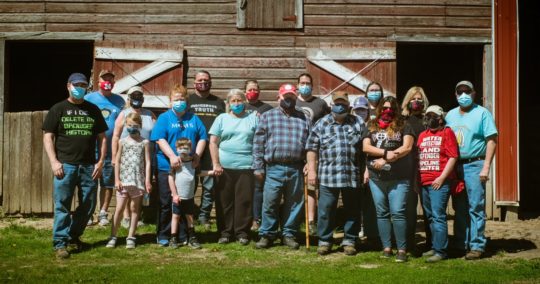Did you hear us on NPR? “Marketplace,” the popular nationally syndicated radio show from American Public Media, came to York, Nebraska to cover our plan to build a wind and solar-powered barn on land directly inside the proposed route of the Keystone XL pipeline. Listen to the Marketplace story below, cross-posted from APM.
Want to help out? Click here to donate to the Build Our Energy project.


(Abbi Harrington and her brother-in-law Rick Hammond farm land in Nebraska in the path of the Keystone XL pipeline. They and other farmers in York County are organizing opposition to the pipeline. Photo: Sarah McCammon)
In Nebraska, standing in the way of Keystone XL pipeline
As developers of the proposed Keystone XL Pipeline await a decision from the Obama Administration, landowners have a new plan to fight the project. A decision on the underground pipe, which would move oil from Canada to refineries on the Gulf Coast, could come as soon as the end of this year.
Nowhere has the idea been more controversial than Nebraska, where farmers and ranchers fear it could damage land and water. The Harrington family traces back their roots to rural York County. Four sisters grew up here, helping out with the crops and livestock, on land that was homesteaded by their great, great grandparents in the 1860s.
Rick Hammond is married to one of the sisters, Heidi. The couple also farms land owned by a sister who lives out of state. Some of that ground is believed to be directly in the path of the pipeline. The family is backing a plan to build a barn, powered by solar panels and a residential-sized wind-turbine at the edge of this field.
Hammond says it will serve as a meeting center for pipeline opponents. “We want to make an example that the old, dirt, energy, if it comes through, would be destroying new, clean energy,” he says.
It’s a small project, with a budget around $65,000. Groundbreaking is planned for August with construction in September. But it’s not the only obstacle the pipeline developer, TransCanada, faces. Environmentalists have staged protests, saying oil from the pipeline would accelerate climate change. Some landowners are refusing to sign easements or allow the company on their land.
Consultant Jeff Rauh, a project representative for TransCanada, says, “Part of what we do every day with the pipeline is work with obstacles and obstructions in the right of way.”
Last year, the Obama Administration said no to the original route, which cut through the environmentally sensitive Nebraska Sandhills. But even the new plan worries landowners like Shannon Graves in York County.
“We didn’t really realize until they came out and surveyed and planted that little stick in the ground that it was so close to our house,” she says. Graves says it’s about 300 feet from where she and her husband sleep.
Opponents in several counties along the route are working on resolutions against the pipeline. Not all Nebraskans are fighting it, though. Some labor groups say the project would bring good jobs for construction workers.




